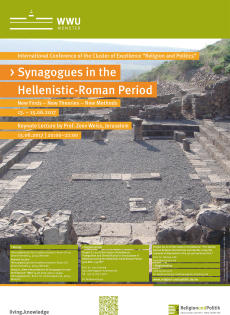Synagogues in antiquity
International Conference on Jewish Places of Assembly and the Methods of their Exploration

An interdisciplinary conference of the Cluster of Excellence “Religion and Politics” of Münster University focuses on Jewish synagogues in the Hellenistic-Roman period and on the methods of their exploration. Archaeologists, theologians, Judaic scholars and ancient historians discuss the recent archaeological finds as well as new theories and research approaches on these religious meeting places “In the past 25 years, the number of synagogues excavated in Israel has greatly increased, in particular the early synagogues from Roman times,” Protestant theologian and Judaic scholar Prof. Dr. Lutz Doering explains. Together with the Protestant theologian Prof. Dr. Hermut Löhr and Dr. Andrew Krause from the Cluster of Excellence, he organised this conference. Resulting from the new finds, new questions arise in terms of the definition as well as function of synagogues. “The increase of data makes it necessary to look at the new finds in a critical way, whether they should be included into the typology of early synagogues and whether the definition could be refined on this basis. Another question is thought to be related to the transformations of the synagogue as institution, for example beyond the destruction of the Jerusalem temple in 70 AD. The conference is also to reassess earlier reconstructions of the development of synagogues.
The event “Synagogues in the Hellenistic-Roman Period” takes place from 13 until 15 June in Münster. Speakers from Europe, Israel and North-America will take a look on some of the newer finds and new theories and methods in particular. “As archaeologists have continuously provided new data in form of material finds and their contexts, historians and philologists have moved on to using new and complex theoretical and methodological tools with which they examine historical data and literary sources,” Prof. Doering explains. Ancient texts are analysed and newly assessed by using comprehensive new methods from social science and literary studies what is thought to lead to a refined understanding of their significance. The scholars also want to examine the legal and political context as well as the functions of the synagogues during the conference.
Interdisciplinarity
“Research includes a wide range of subjects such as archaeology, ancient history, bible and religious research and is dedicated to the material and textual evidence up to the social history and the analysis of legal and political structures,” says Prof. Doering. This requires a regular exchange with various scholars in order to keep the knowledge in this field up-to-date and to understand the progress and the insights of the complementary disciplines.
In a public evening lecture on Tuesday, 13 June, archaeologist Prof. Dr. Zeev Weiss from the Archaeological Institute of the Hebrew University of Jerusalem will speak on “The Synagogue in an Age of Transition, from the Second Temple Period to Roman Times: Recent Developments in Research”. The lecture will be held in English and takes place in the lecture hall building of the Cluster of Excellence, lecture hall JO 1, Johannisstraße 1 in Münster at 8 pm.
At the Cluster of Excellence, Prof. Dr. Lutz Doering heads the project C2-24 Integration and Diversification in the Judaism of Palestine during the Hellenistic-Early Roman Period (300 BCE–135 CE) in which Dr. Andrew Krause supports as a research assistant. Prof. Dr. Hermut Löhr has co-organised the conference within the scope of the project A2-10 “The Jewish Nomos between Normativity and Identity using the Example of Alexandria in the 1st-3rd Centuries A.D.” Since the summer semester, he is professor for the New Testament at the Faculty of Protestant Theology at the University of Bonn. (ill/maz)

